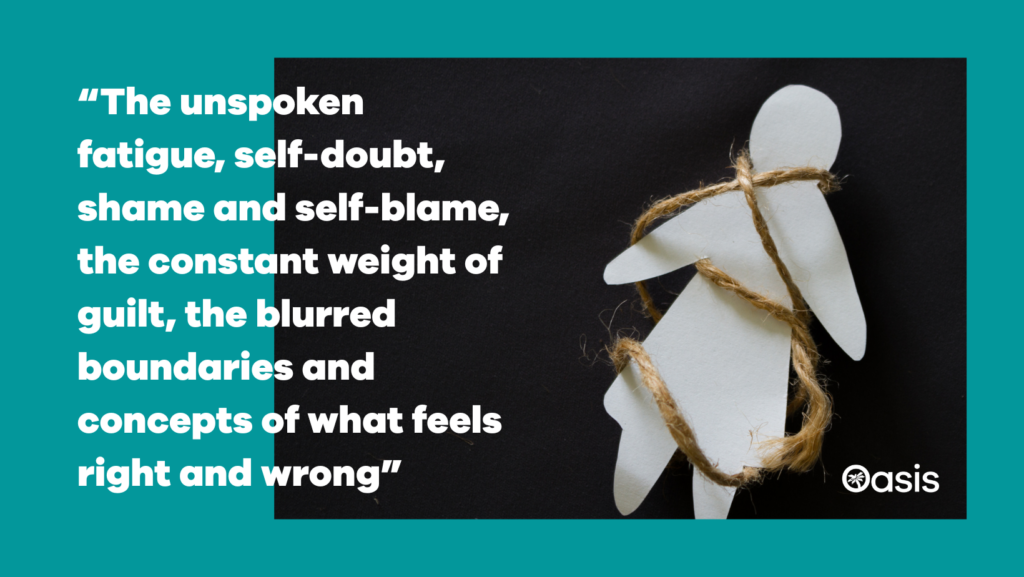By Danielle Georgiou, Domestic Abuse Partnership Specialist at Oasis

The disappointing outcome in the trial of Sean ‘Diddy’ Combes is another all-too-common narrative of an abusive, power-hungry and misogynistic person using his privileges in life to extort, control, seriously harm and endanger multiple victims’ lives. But people will always seem to question the victims’ choices more than the perpetrator of abuse and ask, ‘Was it consent or control?’
I applaud the bravery and remarkable courage of Cassie Ventura and the many victims who came forward to share their stories. They have been subjected to public and media scrutiny, immense pressure and personal risk, whilst recounting painful experiences – a level of scrutiny avoided by Sean Combes, who invoked his right not to testify during the trial.
The core of abuse is about power and control. It is complex, in building up a power dynamic emotionally, financially, physically and socially. The patterns of abuse keep victims dependent, isolated, silent and confused about who they are and what they genuinely want.
Victims of abuse begin to embed the rules and lifestyles of the abuser; they know if they don’t abide by the rules, or show enthusiastic interest, they will pay the consequences and may be ostracised, shut down, cut out, harmed. That fear leaves victims unsettled: the unspoken fatigue, self-doubt, shame and self-blame, the constant weight of guilt, the blurred boundaries and concepts of what feels right and wrong.
It is no longer about their personal needs or wants. It’s not about how it makes them feel as individuals but about keeping the peace. Is the abuser ok? Are they happy with me? If I show them I am adaptable and happy with their requests will they eventually change? I will sacrifice myself out of loyalty, out of hope, out of love, out of fear. People around me are not rising in disgust or distain for the abuser. No one is strongly challenging their behaviours, so maybe it’s just me, maybe it’s not that bad. Maybe I am the problem? If I do what they want me to do, I will be safer.
Cassie and others recounted many experiences of this with evidence of coercion into sexual interactions with other people on Diddy’s orders; the normalised ‘freak off’ parties (which became a symbol of status if you were to gain an invite), a culture that normalised abuse, blackmail and extortion, the forced alcohol and drugs consumption to gain control, the deliberate act of making victims compliant in illegal activity.
Diddy’s victims had personal possessions such as mobile phones withheld, and intimate videos taken and used for blackmail. He controlled when the women could change their tampons, regularly exploding into fits of rage, smashing things and physically assaulting them, often with weapons.
His victims were subjected to constant strategies of humiliation, abuse and trauma; they had to try to navigate life safely with the additional pressure of being in the public eye.
It may seem easy to question victims’ decisions from an outsider’s perspective, and question if it really was abuse if they were seemingly ‘enjoying’ themselves, but if you are living in a dynamic of power, control and fear, rationale is easily erased.
The language of the media, court and legal systems needs to work harder to help people understand the complexities of coercive control, which has been a criminal offence in the UK for a decade now. There is no ‘alleged’ abuse when it has been witnessed and evidenced; they are not accusations. Yet this is still the main way to frame headlines and write reports, used to describe shared accounts of horrific, life changing events that victims have been forced to endure.
Press reporting should avoid sensationalism, as this minimises and misleads perceptions of abuse and its psychological impact. Sensationalist news feeds into victim blaming narratives, which in turn, discourages survivors from coming forward and reporting abuse. Ethical media coverage and legal reporting can help raise awareness and drive policy changes, it can reduce the stigma of being a victim of abuse and help support victims, rather than reinforce harmful stereotypes of how a victim or an abuser ‘should’ look or act.
As a society we need to hear survivors’ voices, not just as passive victims. And we need to reassure survivors like Cassie that the systems in place are there to aid them and not retraumatise them, holding them hostage in another imbalanced power battle, like their abusers did.
If you would like to reach out for support, learn more about coercive control or domestic abuse related topics, please do not hesitate to contact Oasis and read through our other blog posts. When you are ready, we are here for you. We hear you and we will support you. Our helpline is 0800 917 9948.

